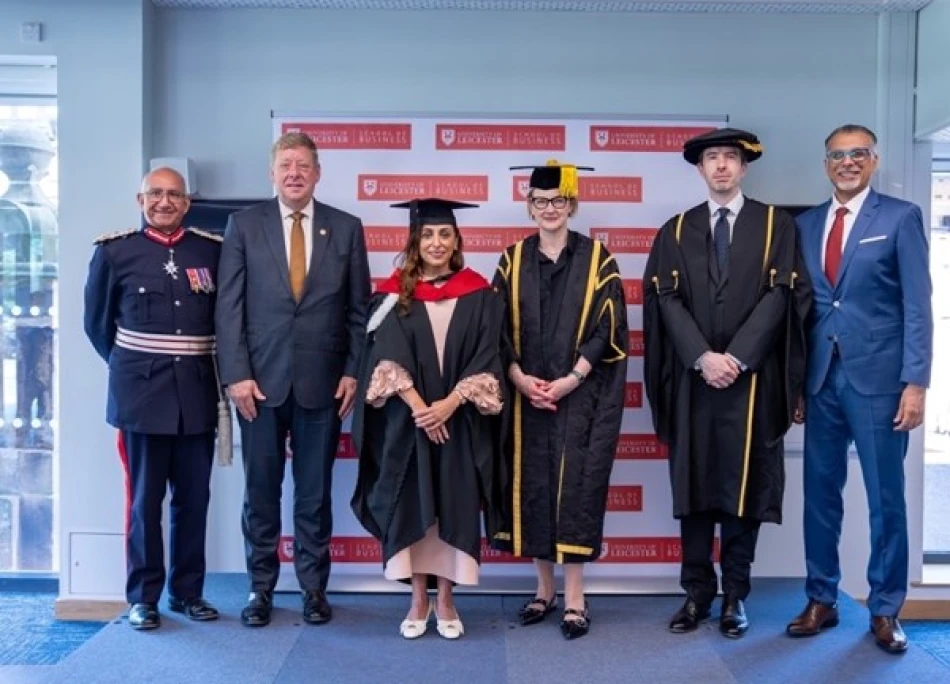
Emirati Trailblazer Bader Al Qasimi Earns Honorary Professorship at University of Leicester, UK
UAE's Sheikha Bodour Al Qasimi Receives Rare Honorary Professorship from Leicester University
The University of Leicester has awarded Sheikha Bodour bint Sultan Al Qasimi, President of the American University of Sharjah, its first-ever honorary professorship title—the highest form of academic recognition the institution offers. This unprecedented honor reflects her transformative impact on women's empowerment, children's literacy, and cultural development across regional and global platforms, signaling growing international recognition of Middle Eastern leadership in education and publishing.
A Historic Academic Recognition
During her visit to Leicester's Business School, Sheikha Bodour was formally presented with the honorary professorship at a ceremony held on the university's Brookfield campus. Professor Henrietta O'Connor, the university's Academic Vice-President, and Professor Dan Ladley, Vice-President and Dean of the Business School, conferred the title in recognition of her pioneering work across multiple sectors.
The ceremony included campus tours, student and faculty meetings, and discussions on museum studies and cultural sector research—areas where Sheikha Bodour has established significant expertise through her various leadership roles.
Building Publishing Bridges Between East and West
As founder and CEO of Kalimat Group, Sheikha Bodour has published over 500 titles across more than 15 countries, addressing social issues through Arabic children's literature and strategic translations. Her approach represents a sophisticated understanding of how publishing can serve as cultural diplomacy, particularly important as Middle Eastern nations seek to expand their soft power influence globally.
Her establishment of the Kalimat Foundation has distributed accessible books across 31 countries, while her advocacy helped the UAE join the Marrakech Treaty, facilitating access to published works for visually impaired individuals. This demonstrates how regional leaders are increasingly engaging with international frameworks to advance social inclusion.
Breaking Gender Barriers in Global Publishing
Sheikha Bodour's appointment as the first Arab woman and only the second woman ever to lead the International Publishers Association since its 1896 founding represents a significant shift in global publishing leadership. Her tenure coincided with the industry's digital transformation and the COVID-19 pandemic's disruption of traditional publishing models.
Through her "PublisHer" initiative, she created global networks supporting women's leadership in publishing—a sector traditionally dominated by male executives despite women comprising the majority of readers and many editorial roles. This strategic focus on gender equity positions the UAE as a progressive force in international cultural industries.
Transforming Higher Education Leadership
Since assuming the presidency of the American University of Sharjah in 2023, Sheikha Bodour has implemented ambitious reforms targeting gender representation in senior academic and administrative positions. Her establishment of the "Sheikha Jawaher bint Mohammed Al Qasimi Chair for Women's Leadership"—the UAE's first dedicated to women's professional development in higher education—signals a systematic approach to addressing gender gaps in academia.
Under her leadership, the university launched six new research centers focusing on artificial intelligence, sustainability, and Arab-Islamic studies, while expanding scholarships for students with disabilities and those from modest financial backgrounds. This comprehensive approach reflects broader trends in Gulf higher education toward research excellence and social inclusion.
Economic Impact Beyond Education
Sheikha Bodour's influence extends into economic development through her leadership of Sharjah Entrepreneurship Center "Sheraa," which has supported over 150 startups that collectively raised $128 million in investments and created more than 1,400 jobs. This entrepreneurial ecosystem development mirrors successful models in Dubai and Abu Dhabi, contributing to the UAE's economic diversification strategy.
As head of Sharjah Investment and Development Authority, she oversees strategic projects in tourism, sustainability, healthcare, and the creative economy. Her supervision of the Sharjah Research, Technology and Innovation Park—a $150 million initiative attracting over 2,000 companies and research investments exceeding $100 million—demonstrates how regional leaders are building knowledge economies.
Cultural Diplomacy Through Global Platforms
Her leadership roles in UNESCO's World Book Capital Network and the World Economic Forum—where she became the first Emirati woman to chair the MENA Regional Business Council—position her as a key voice in international cultural and economic dialogue. These appointments reflect growing recognition of Gulf expertise in areas traditionally dominated by Western institutions.
The successful bid for Sharjah to become UNESCO World Book Capital 2019, which she led, exemplifies how cultural initiatives can enhance national branding and soft power projection. Her establishment of the House of Wisdom cultural landmark further reinforces Sharjah's positioning as a regional knowledge hub.
Implications for Regional Academic Cooperation
Leicester University's unprecedented recognition suggests increasing British institutional interest in deeper partnerships with Gulf educational leaders. As UK universities face funding pressures and seek international collaboration, leaders like Sheikha Bodour represent valuable bridges between Western academic traditions and rapidly developing Middle Eastern educational systems.
Her Cambridge and University College London credentials, combined with her practical leadership experience, embody the type of East-West academic synthesis that many institutions now seek. This recognition may encourage similar partnerships between British universities and other Gulf educational leaders, potentially reshaping international academic cooperation patterns.
The honorary professorship represents more than individual recognition—it signals a broader shift toward acknowledging Middle Eastern leadership in global education, publishing, and cultural development, with implications for future international academic and cultural partnerships.
Most Viewed News

 Layla Al Mansoori
Layla Al Mansoori






